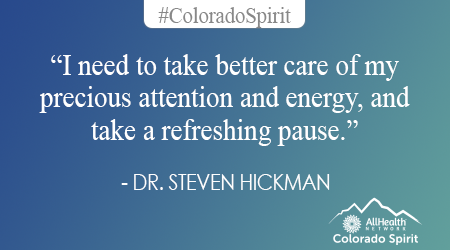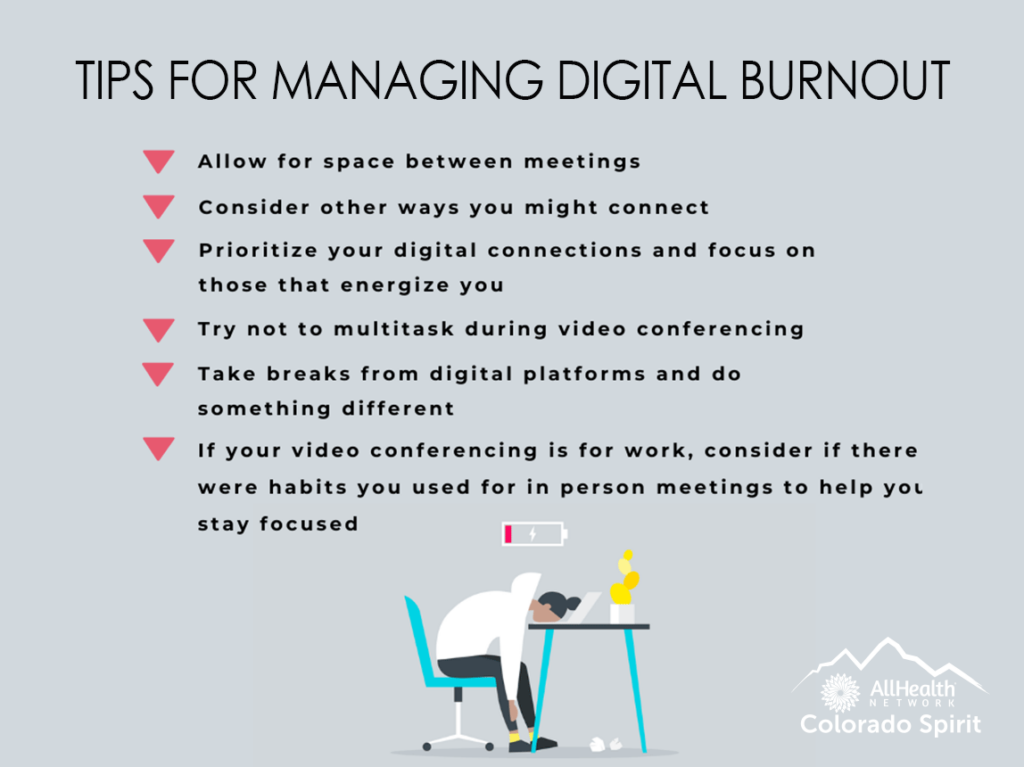For many of us, digital platforms have been in high use for the past several months. Between work, school, socializing, engaging in worship practices, exercising, and getting the latest news, many of us have been more tied to electronic devices than ever. This is a mixed bag though. While many people have been able to use technology to stay connected, we can be exhausted by it.
There is actual science behind this exhaustion. Because of the way our brains process information, video conferencing creates strain that connecting with people in person or on the phone does not. Between losing out on some non-verbal cues and having to take in more visual information all at once, our brains are being taxed.
Another challenge – looking at our own faces is stressful for a lot of us! National Geographic explains this science in more detail here.
Additionally, for many of us our levels of fear, anxiety, and emotional distress are still quite high. There are many factors in our world right now that are contributing to continued feelings of uncertainty, unease, and disconnection. The toll this emotional strain takes on us is intensified with the mental strain of online connection.
So, what’s a person to do?
- Allow for space between meetings – As tempting as back-to- back commitments can be because you don’t have to factor in commute time, it is imperative that we give ourselves some downtime.
- Consider other ways you might connect with people – Would a phone call work? Are you able to maintain physical distancing and connect in person? Would an email exchange be effective? Would a text work?
- Prioritize your digital connections and focus on those that energize you – Think of your energy for online connections like a budget. You only have so much, so if a connection is particularly important to you, “save up” for it by cutting some other online tasks out of your

- Try not to multitask during video conferencing – It can be tempting to try to use webinar time to catch up on a few other items, but the splitting of attention just adds to our mental
- Take breaks from digital platforms and do something different – Stretch, walk, meditate, practice a breathing exercise, do push-ups, lay down in a sunny spot, pet an animal…whatever gives you a little distance from your screens. Even just 5 – 10 minutes can help with
- Try focus strategies – If your video conferencing is for work, consider if there were habits you used for in person meetings to help you stay focused. Activities like doodling or taking notes on paper help many of us focus. That can feel odd during a video conference, when there can be a felt sense of needing to look directly at the camera for the meeting to “prove” you are paying
Depending on the context of the meeting though, you may be able to announce what you are doing to make it feel less awkward. One of my co-workers always takes notes in meetings. When we meet via video conference these days, she simply makes a quick statement that she is taking notes and we move on. Speaking openly about it or even making jokes (I have been known to tell people that they are seeing my “typing face” while I take notes on video conferences) can help give us space to engage in our more natural behaviors.
Out of all our tips the strongest suggestion is to KEEP CONNECTING! Do not let digital or technology burnout stop you from connecting with people and practices that are meaningful to you. Recognize that connection is one of the most powerful active coping skills we can use right now, and please keep engaging.
Would speaking to someone help?
AllHealth Network, along with other community mental health centers, is continuing to provide services via telehealth and by phone. Our Crisis Walk-in Center remains open 24/7 and offers in-person care to those experiencing a mental health crisis. For more information and to get connected with our services, please call 303-730-8858. To learn more about what other community mental health centers are doing, please visit the Colorado Behavioral Health Council COVID-19 website.
If you are experiencing a mental health crisis and are in need of immediate assistance, please call the Colorado Crisis Hotline at 1-844-493-TALK (8255) or text TALK to 38255
How do you know if you’re experiencing a mental health crisis? Click here to learn about mental health crisis warning signs to look out for from the National Alliance on Mental Illness (NAMI)
Resource Links
- TED – Zoom fatigue is real – here’s why video calls are so draining
- Mindful – Zoom Exhaustion is Real. Here Are Six Ways to Find Balance and Stay Connected
- CBC – ‘Zoom Fatigue’ is setting in: What it is and how to prevent it
- Northeastern – ‘Zoom Fatigue’ is real. Here’s why you’re feeling it and what you can do about it
- Psychology Today – Zoom Fatigue: Don’t Let Video Meetings Zap Your Energy
- Harvard Business Review – How to Combat Zoom Fatigue


